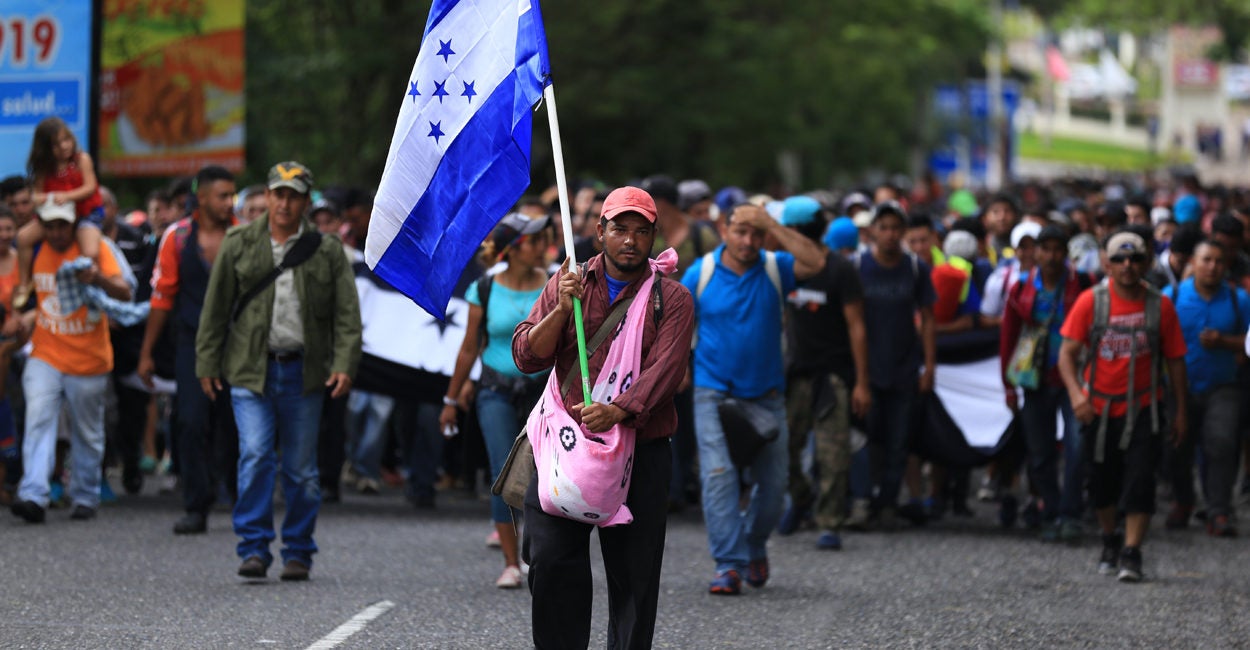For the second time this year, a caravan of Central American migrants is headed to the United States.
The group took off from San Pedro Sula earlier this week, a city located in the northern part of Honduras. The caravan crossed into Guatemala on Wednesday and is expected to cross into Mexico as they travel to the U.S.’s southern border. Originally the group started off in the few hundreds, they are now around 4,000 people.
This latest migrant caravan is another example of leftist groups grandstanding off of desperation and poverty. The Northern Triangle region of Central America where El Salvador, Guatemala, and Honduras are located is one of the most violent areas of the world. Transnational organized criminal groups and violent street gangs destabilize these impoverished countries. This leaves massive parts of the population vulnerable and with little means to survive.
The Daily Signal depends on the support of readers like you. Donate now
Unfortunately, local governments lack the capacity and at times, the political will, to address these challenges.
Just like the migrant caravan earlier this March, organizers of this march are weaponizing poor Central Americans. This caravan was organized by Bartolo Fuentes, a former Honduran legislator and member of the radical leftist Libre party. He was detained by Guatemalan authorities on Tuesday for illegally entering the country.
Libre is not a political party but a destabilizing movement. It was founded in 2011 by former President Manuel (Mel) Zelaya. In 2009, Zelaya was removed from power after repeated attempts to undermine the constitutional order and rule of law. Zelaya is an ally of socialist governments in Latin America like the Castro and Maduro regimes in Cuba and Venezuela.
Following Libre’s losses in the 2013 and 2017 presidential elections, Libre’s turned to a public campaign of generating turmoil and instability.
I travel to Honduras frequently and experienced the chaos firsthand. In 2013, I was an international observer for the presidential elections. I was at the electoral tribunal headquarters as the votes were being counted when Zelaya stormed in and held a press conference disputing the election result.
His claim was ridiculous, as polls had only closed hours before. But he had a personal interest in the election: His wife was the party’s candidate. She ended up losing, earning less than 30 percent of the overall vote.
Even though various international groups gave the election a clean bill of health, party activists and agitators protested the results for days afterwards, shutting down major streets and highways.
Later in 2015, I returned to Honduras for a business trip. I was preparing to leave my hotel when the military showed up and told us that thousands of demonstrators carrying burning torches were headed to the presidential palace, which was right next to the hotel. For hours, we were confined in the hotel while thousands of protesters shut down traffic at the height of rush hour.
This caravan antic is right out of the left’s disorder and chaos playbook. The timing before the U.S.’s midterm elections and the change of presidency in Mexico is not coincidental. It is also clear the caravan organizers are more interested in creating turmoil than the well-being of the migrants.
The journey through Central America and Mexico is full of hazards, and migrants are frequently robbed, sexually assaulted, and go for long stretches without eating. Some fall prey to human trafficking organizations. Women and children are particularly vulnerable to these crimes.
The problem here is not a lack of compassion for these people, but rather, the dangerous precedent created by allowing a massive caravan to arrive at the U.S.’s southern border. The U.S. immigration system is already stretched beyond capacity and must prioritize those who apply for asylum in good faith.
Source and transit countries in the region have a role to play in stemming these flows. Secretary of State Mike Pompeo is traveling to Mexico on Friday to visit with his counterparts and address the crisis.
The U.S. must take action to secure its borders and faithfully enforce its law. Loopholes must be closed and adequate enforcement resources brought to bear. This can be done in a humane manner while also protecting those who truly qualify for asylum.





























